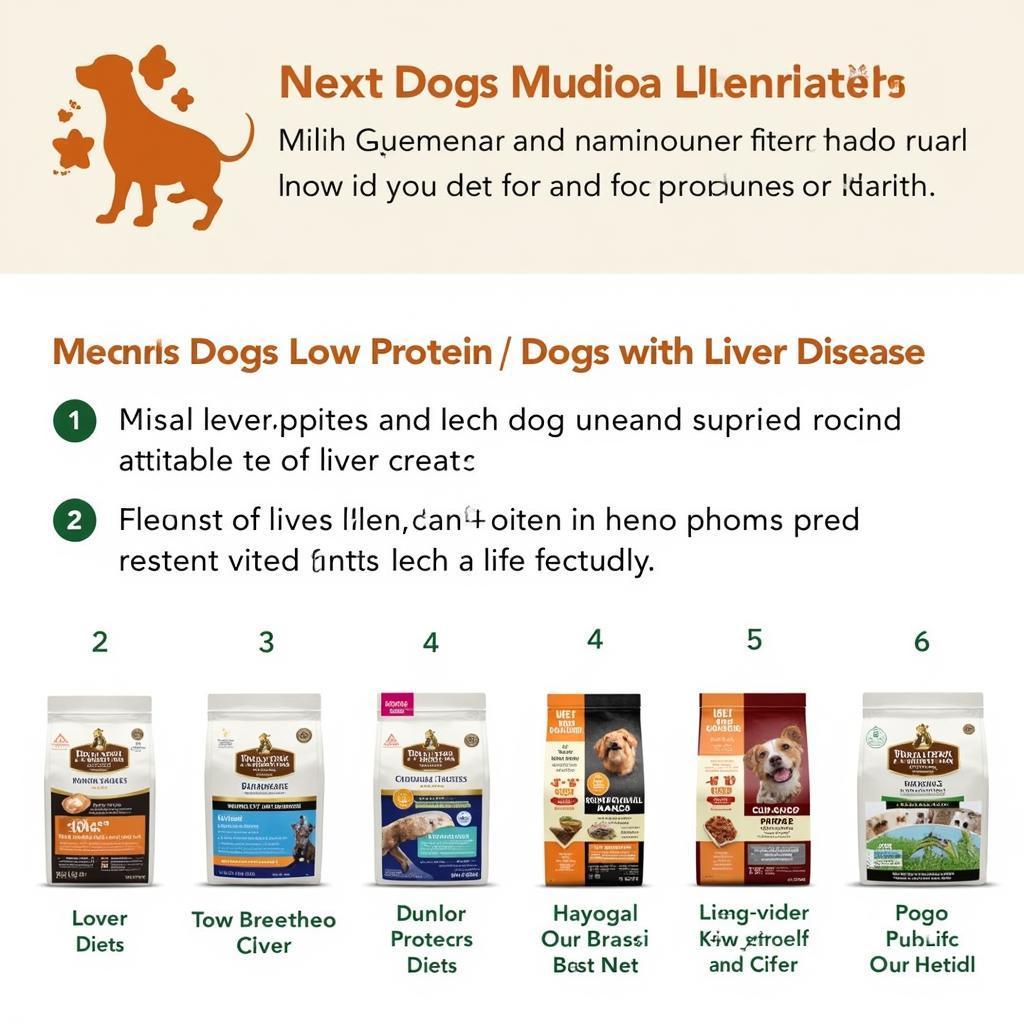Hepatic Dog Food Recipes are crucial for dogs suffering from liver disease. A proper diet plays a vital role in managing this condition and improving your furry friend’s quality of life. This article will delve into the importance of hepatic diets, provide a sample recipe, and address common questions about feeding a dog with liver problems.
Understanding the Importance of Hepatic Dog Food
Liver disease can significantly impact a dog’s ability to process nutrients and toxins. A hepatic diet is specifically formulated to support liver function by reducing its workload. These diets are typically lower in protein, copper, and sodium, while being higher in easily digestible carbohydrates and healthy fats. They also often include increased levels of zinc and B vitamins, which can be beneficial for liver health. Choosing the right hepatic dog food recipe is essential to providing optimal nutrition and supporting your dog’s recovery.
Crafting a Delicious and Nutritious Hepatic Dog Food Recipe
Creating a homemade hepatic dog food recipe allows you to control the ingredients and ensure your dog receives a balanced and appropriate diet. Always consult with your veterinarian before switching your dog to a homemade diet, as they can help you tailor the recipe to your dog’s specific needs. Here’s a sample recipe to get you started:
Ingredients:
- 1 cup cooked white rice
- 1/2 cup cooked skinless chicken breast, shredded
- 1/4 cup cooked sweet potato, mashed
- 1/4 cup cooked carrots, chopped
- 1 tablespoon olive oil
- 1/2 teaspoon ground flaxseed
Instructions:
- Combine all ingredients in a bowl.
- Mix well until evenly distributed.
- Serve at room temperature or slightly warmed.
This recipe is a starting point and can be adjusted based on your dog’s individual needs and preferences. Your veterinarian can help you determine the appropriate portion sizes and recommend any necessary supplements.
 Homemade Hepatic Dog Food for Liver Health
Homemade Hepatic Dog Food for Liver Health
Key Considerations for Hepatic Diets
When feeding a dog with liver disease, several factors are crucial to consider. Protein restriction is often necessary to reduce the production of ammonia, which the damaged liver may struggle to process. Similarly, limiting copper intake is important as excess copper can accumulate in the liver and exacerbate the condition. Sodium restriction helps manage fluid retention, a common complication of liver disease.
Why Choose Low Protein, Copper, and Sodium?
Low protein helps reduce the workload on the compromised liver. Copper restriction prevents further liver damage. Reducing sodium helps manage fluid buildup, a common issue with liver disease.
 Dog Food with Low Protein, Copper, and Sodium for Liver Support
Dog Food with Low Protein, Copper, and Sodium for Liver Support
Addressing Common Questions about Hepatic Dog Food
What are the signs my dog needs a hepatic diet? Signs may include jaundice, vomiting, weight loss, and increased thirst. However, only a veterinarian can diagnose liver disease and recommend a hepatic diet.
How can I transition my dog to a new hepatic diet? Introduce the new food gradually over several days, mixing it with the old food in increasing proportions. This helps prevent digestive upset.
What other foods should I avoid giving my dog with liver disease? Avoid high-fat foods, table scraps, and anything containing xylitol, an artificial sweetener toxic to dogs.
Expert Insights on Hepatic Dog Food
Dr. Emily Carter, a veterinary nutritionist, emphasizes the importance of a balanced hepatic diet: “A properly formulated hepatic diet can significantly improve the quality of life for dogs with liver disease. It’s crucial to work with your veterinarian to create a personalized plan.”
Dr. David Miller, a board-certified veterinary internist, adds: “Early diagnosis and dietary management are key to managing liver disease in dogs. A hepatic diet can help slow the progression of the disease and minimize complications.”
Conclusion
Hepatic dog food recipes are essential for managing liver disease in dogs. By understanding the importance of a low protein, copper, and sodium diet, and working closely with your veterinarian, you can provide your furry friend with the nutrition they need to thrive. Remember, a proper hepatic diet isn’t just about food; it’s about providing the best possible care for your beloved companion.
FAQ
- What is a hepatic diet for dogs?
- Why is protein restricted in hepatic diets?
- How do I know if my dog needs a hepatic diet?
- Are there commercial hepatic dog foods available?
- Can I make hepatic dog food at home?
- What are the common signs of liver disease in dogs?
- How can I make the transition to a hepatic diet easier for my dog?
For further assistance, please contact us at Phone: 02437655121, Email: minacones@gmail.com, or visit us at 3PGH+8R9, ĐT70A, thôn Trung, Bắc Từ Liêm, Hà Nội, Việt Nam. We have a 24/7 customer support team.